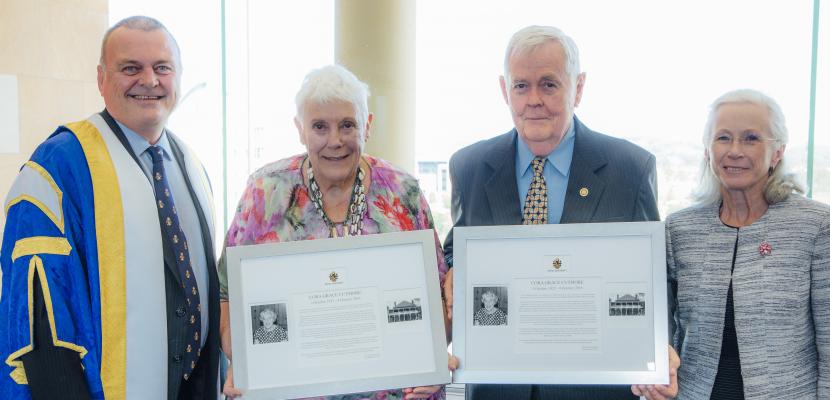
Bond University has officially recognised and honoured the largest single private donation it has ever received.
The Cutmore Family Recognition Event, held on Thursday, 23 November, was attended by family and friends of the late Cora Grace Cutmore who passed away on her 93rd birthday in October last year, leaving a multi-million dollar bequest to the University’s Clem Jones Research Centre for Regenerative Medicine.
All funds donated to the University will be directed to research into the development of stem cell therapies, including those to treat age-related macular degeneration.
“Cora and her sister Vera both suffered from macular degeneration and understood the trauma of losing your vision virtually piece by piece,” said Ms Cutmore’s niece, Janet Price.
“For active elderly people like Cora and my mother, it gradually prevents them from doing all the things they love – playing bridge, gardening, painting, reading – and completely erodes the independence they have fought so hard for.
“The family hopes that Cora’s legacy will help Bond’s researchers fast-track the excellent work they are already doing at the Clem Jones Research Centre to explore the potential of stem cell treatments for the next generation.”
Whilst Bond University relies on corporate and public philanthropy – even more so than government-funded institutions – what makes this endowment particularly significant is that it comes, not from a multi-national corporation or a wealthy foundation but from a retired nursing sister who built her ‘nest egg’ buying and selling shares.
Born and raised on Queensland’s Southern Downs, Cora Grace Cutmore trained as a midwife and mothercraft nurse. In the years following World War II, she travelled overseas to work in England, Europe, the United States and Papua New Guinea where she was stationed in the highlands and lived in a dirt floor hut. She also spent a number of years treating children and mothers in isolated villages on PNG’s off-shore islands.
Returning to Australia, Sister Cutmore became a travelling infant welfare nurse in country Victoria. Based at the Maternal and Child Health Centre in Orbost, she would drive out to the smaller towns, setting up her makeshift baby clinics in community halls, on farmhouse verandahs and even in the back of her station wagon.
She ended her career working in hospitals on Victoria’s Mornington Peninsula and ultimately retired back in Queensland, close to her brother and sister in Buderim.
As a single woman with no children, Cora was always conscious of the need to be financially self-sufficient. She began buying shares early in her career, keeping meticulous hand-written records of purchases, sales and bonuses, and travelling to Melbourne to attend the various companies’ annual shareholder meetings.
“Depending on the quality of refreshments they served, I’d either keep the shares or sell them,” she once told her niece, Janet. “That system never let me down!”
Cora ultimately grew those shares into a multi-million dollar portfolio. While living modestly herself, she used the proceeds to support various philanthropic causes including a training program to upskill outback nurses and endowing the Cutmore Distinguished Professorship of Stem Cell Research at Bond University which is now held by Professor Helen O’Neill who heads the Clem Jones Research Centre.
“Cora’s is an extraordinary story of a woman who dedicated her life to caring for others,” said Bond University’s Director of Research, Andrew Calder.
“I was privileged to speak with her about our research program before she died and, even in her 90s, she was a formidable woman with a keen intellect.
Bond University’s Vice-Chancellor and President, Professor Tim Brailsford, said “Cora was a woman ahead of her time in terms of playing the share market and building her portfolio to support her independence.”
“The fact that she has chosen to donate the bulk of her estate to medical research reflects her lifelong contribution to healthcare and her keen financial acumen, creating a lasting legacy that will benefit future generations,” he said.
Professor Helen O’Neill, one of Australia’s leading immunology and stem cell experts, and newly-appointed Cutmore Distinguished Professor of Stem Cell Research at Bond University, said Cora’s bequest was highly significant and very much appreciated.
“Cora’s extraordinary bequest, along with her endowment of the Cutmore Distinguished Professorship, will ensure that her memory will live on in perpetuity as we progress our research in a bid to cure age-related vision loss. She will always be esteemed as a member of the Bond University family.”
In recent years Professor O’Neill and her team of researchers in Bond University’s Clem Jones Research Centre for Regenerative Medicine have made a number of medical breakthroughs in the journey to restoring sight to patients with acute macular degeneration.
The Centre’s research projects have produced membrane technology which has been patented and its work in the implantation of stem cell-derived retinal cells into the eye to replace cells damaged through disease has been recognised as cutting-edge, and one of the most promising applications of stem cell therapy currently in development.